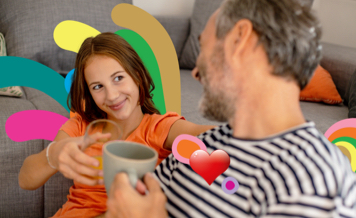ADHD: Symptoms, diagnosis and support options
Children and teenagers with attention deficit hyperactivity disorder (ADHD) often have many strengths. They might be highly creative, focus deeply on topics they love and be adventurous and open to new experiences.
Like all children, those with ADHD can also face challenges. Difficulties with attention, impulse control or sitting still can sometimes affect how they learn, behave and connect with others. But with understanding and the right support or treatment, children with ADHD can live full, happy lives.
Jump to section: Symptoms | Diagnosis | Treatment | Support at home | Where to get help
Read more: Getting diagnosed with ADHD in adulthood
What is ADHD?
ADHD is a natural variation in how the brain processes information. It often begins in early childhood, and affects around 1 in 20 Australians.1
The exact cause of ADHD isn’t fully understood. For some children, genetics play a strong role, and ADHD often runs in families, but this is not the case for every child.
It’s important to remember that ADHD is not caused by poor parenting, and it is not a sign of low intelligence.
Symptoms and causes of ADHD
Children with ADHD usually experience symptoms in one or more of the following areas.
Inattention
Children may find it hard to stay focused, follow instructions or complete tasks. They might lose items like schoolwork or lunch boxes, or be easily distracted by small things around them.
Hyperactivity
Children might fidget, find it difficult to sit still, rush through tasks or talk a lot.
Impulsivity
Children may interrupt others, call out in class, act without thinking or struggle to wait their turn.
A child may show symptoms in one area or across all three. Health professionals use this to help determine whether a child’s ADHD is the inattentive type, hyperactive-impulsive type or combined type.
Not all children who are active, daydreamy or impulsive have ADHD, and symptoms can vary greatly from child to child.
Getting an ADHD diagnosis for your child
In most cases, children need to be aged 5 or older to be assessed for ADHD. Younger children may show signs of ADHD, but this is usual behaviour for their age.
If you think your child may have ADHD, booking an appointment with your GP is a good place to start. They can refer you to a paediatrician, child psychologist or psychiatrist for a full assessment. That’s because there is no single test for ADHD: a diagnosis is based on information from parents, teachers, health professionals and sometimes the child themselves. Characteristics must be present in more than one setting (for example, at home and school) and have lasted at least six months.
Getting a diagnosis can mean getting support for your child to help them build on their strengths and manage challenges.

24/7 Medibank Mental Health Support
Medibank health insurance members can chat to a mental health professional about how they feel and ask questions about a range of mental health concerns for themselves or a loved one and get guidance on what they can do next. Chat online or call 1800 644 325 anytime of the day or night, 7 days a week at no extra cost.~
Treatment and support for children with ADHD
With the right treatment and understanding, children with ADHD can thrive. Treatment and support may include:
- behaviour therapy to help children build social and organisational skills, while parents learn strategies to support them at home.
- school support, whereby teachers can break tasks into smaller steps, reduce distractions and offer extra time for tasks.
- medication, such as stimulant or non-stimulant medicines to help children focus, slow down and manage impulsive behaviour.
- counselling or cognitive behavioural therapy (CBT) to help children and families manage emotions and stress.
Diagnosing and managing ADHD often involves support from more than one health professional (for example a GP, psychologist, psychiatrist or speech pathologist); they will work with you to find the right treatment and support plan for your child.
Supporting your child at home
Parenting a child with ADHD can be challenging, but your support is vital in helping them feel understood and confident.
Try to keep a consistent daily routine to help your child know what to expect. Use clear and simple instructions, and ask your child to repeat them to ensure understanding. Breaking tasks into smaller steps can make them easier to manage.
Praise your child for their efforts and celebrate their strengths and interests. Positive reinforcement helps build confidence. When setting boundaries, stay calm and consistent; avoid yelling and use clear consequences, like a time out for younger children or a technology ban for teenagers.
Encourage healthy habits like regular sleep, nutritious meals and daily exercise, which can improve focus and mood. Explain ADHD in a way your child can understand so they know it’s not their fault and that their brain just works differently.
Working with your child’s teachers to share strategies and request helpful adjustments in the classroom can make a big difference at school, too.
And remember to care for yourself; parenting a child with ADHD takes energy, so find time to recharge and seek support when needed.
Where to get help
If your life or someone else’s is in danger, call 000 immediately.
If you’re in distress and need help, call Lifeline on 13 11 14 for 24/7 crisis support.
For non-emergency support, your GP or regular health practitioner is often the best place to start. They will be able to assess your individual situation and recommend the best next steps.
Medibank health insurance members can chat to a mental health professional about how they feel and ask questions about a range of mental health concerns for themselves or a loved one and get guidance on what they can do next. Chat online or call 1800 644 325 anytime of the day or night, 7 days a week at no extra cost.~
Remember that help is always available, no matter the situation.
How can we help?
I want to know how my cover supports mental health
I need help and want to talk
Related articles
Things you should know
1 The Royal Children's Hospital Melbourne
~ Some referred services may involve out of pocket costs and waiting periods may apply.
While we hope you find this information helpful, please note that it is general in nature. It is not health advice, and is not tailored to meet your individual health needs. You should always consult a trusted health professional before making decisions about your health care. While we have prepared the information carefully, we can’t guarantee that it is accurate, complete or up-to-date. And while we may mention goods or services provided by others, we aren’t specifically endorsing them and can’t accept responsibility for them. For these reasons we are unable to accept responsibility for any loss that may be sustained from acting on this information (subject to applicable consumer guarantees).





